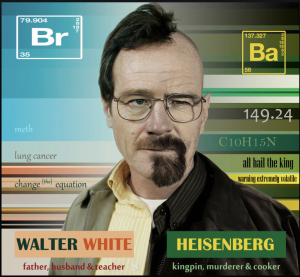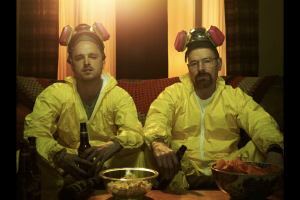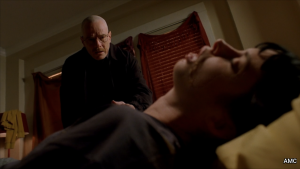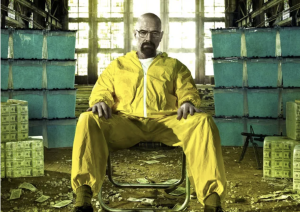8 The Black Market, the Subconscious Mind, & Breaking Bad… What do they have in Common?
Have you ever experienced “the call of the void?” If not, imagine yourself the last time you were standing on the edge of a cliff, driving your car down a freeway, or staring into a burning fire. What were your initial thoughts? Did you want to jump off the cliff, swerve off the highway, or burn your hand in the fire (Staff, 2022)? These thoughts are what scientists call “the call of the void,” which is a concept normal for people to think about but abnormal to act on (Id, Ego and Superego, 2020). Even though most of us will never answer the call, we can read about such experiences through characters in books, movies, and shows.
In AMC’s famous show Breaking Bad, Walter White is your typical kind, caring, and high-moral high school chemistry teacher. He lives a seemingly dull and uneventful life; however, his life is stable and functional. In the pilot episode (S1E1 9:14-9:33), White learns he has lung cancer and is told he does not have much time to live. The fear of leaving his family in huge debt compels him to answer his call to the void, and he has his life turned upside down. White enters the drug trade to help his family after his passing by taking on the role of the kingpin, Heisenberg. As Walter White navigates the black and legal markets, the interplay between his id and superego will determine the balance of trust, rules, and power in the markets.
Walter White struggles to live with this interplay and soon learns that the legal market can not exist without the black market and vice versa. The legal and black markets symbolize a special relationship. The black market, legal market, and the economy can not exist without one another, and there must be a balance among them. Similarly, the need to balance one’s id, ego, and superego is based on Freudian personality theory (Id, Ego and Superego, 2020). In this theory, the id represents the devil’s dark desires and urges, like the black market. At the same time, the superego represents high morals and ethics, like the legal market. Finally, the ego represents society’s economy, and the outcomes will come from two other factors: balance or imbalance.
In Breaking Bad, the personalities of Walter White and Heisenberg always coexisted, though, “Heisenberg” was suppressed. Even though Walter White is mostly kind, caring, and has high morals, there are glimpses of Heisenberg in his heart. From the beginning, the show hints at the balance between the two personalities. Breaking Bad mentions White’s start-up business called “Gray Matter,” named after White’s and his partner’s last name, Schwartz, meaning black in German. White left the company due to personal reasoning, but later, the audience learned that it was due to White feeling inferior to his then-girlfriend and her family’s wealth. After leaving the company, Gray Matter started to do exceptionally well, causing White to lose out on the company’s success. White blamed his partner and then-girlfriend for his downfall, but it was his fault. Ultimately it was his ego and pride that caused his fall.
In season 4, episode six, we see Heisenberg powerfully emerging, foreshadowing his eventual downfall. In this episode, there is is a scene where Walter White, the superego, is suppressed by Heisenberg, the id, as he explains to Skylar, his wife, that she doesn’t know who she is talking to and that they should not be afraid of danger. He tells her that he is the danger and the one who knocks and shoots the gun (S4:E6 9:13-9:44). Throughout the entire show, Walter White tries to convince himself that everything he has done is for his family and nothing else. The viewer, however, understands the dramatic irony. While White thinks his motives and family values were driving his actions, the audience knows he’s lying to himself. This climax is where Heisenberg breaks free from his prison and is finally not held back by his Walter White persona, becoming something else. White finally admits that he no longer did it for his family but rather did it for his ego, pride, and lust for power. Letting the id take control shows how even the most innocent soul can be corrupted.

The show portrays how an imbalance of the superego leads to a lack of trust and violence. At the show’s very beginning, White looks for his old student, Jesse Pinkman, to help him cook methamphetamine and distribute it to the black market. After Pinkman praised White’s meth for its purity, he went Pinkman’s distributors, Kraze and Emilio. They, not trusting that Pinkman made the product, decided to hold Pinkman and White at gunpoint, ready to dispose of them. Luckily, White could incapacitate Kraze and Emilio with phosphorus gas, which killed Emilio. While Kraze was held captive, White was torn between letting Kraze free or killing him, showing that his superego would not let him hold Kraze prisoner. Just as White was planning to let Kraze go, White quickly figured out that his kindness was being used as the captive had hidden a broken plate shard and was going to kill him as soon as he was free. White had no choice but to kill Kraze (S1E1 39.01-39.81). As he was strangling him, he was in tears, and after Kraze died, he kept apologizing with tears streaming down his face. White was troubled by this event and felt incredibly guilty as this was the first time he had taken a life. Since the black market has no legal binding like a contract, trust is critical. A lack of trust means no business for either party. Kraze didn’t trust White, and White was, at the time, still very naive, which ultimately resulted in the death of Kraze with no benefit to either party.
Another scene portrays Walter White’s imbalance, having his id personality becomes more dominant. In this scene Todd, a member of a mercenary group, pulls a gun on a child and kills him. This incident occurs as White tries to gain more power. White had decided to raid a train car filled with methylamine to keep up with the black market’s demand for methamphetamine. With such power also comes a lot of pride and paranoia, and when a child sees their heist, White does not show remorse as Todd kills the child (S5E5 46:59-47:04). White simply stands there and stares as Jesse screams, “No!” at Todd. White is also the first person to see the child and could have prevented the child’s death. Yet his fear of the child telling someone stops him from taking action that could save the child’s life. The child’s death greatly diminishes the relationship between White and Pinkman, as it causes Pinkman not to trust White as much as before. The lack of trust between two individuals within a black market creates instability in the whole black-market operation and the partnership.

White leaning into the “right way” and not being adaptive causes him to be in a dangerous situation. Following rules and norms are essential in any market, but being unable to adapt to different rules can result in violence and imbalance in the markets. After the death of Kraze, White and Pinkman still needed a distributor to move their meth. The need for a distributor causes Pinkman to seek out Tuco, known for his massive drug operation and tendency to kill anyone and everyone. When Pinkman brings their meth to Tuco, he is nearly beaten to death and sent to the hospital. White attempts to use the rules that he uses in his normal social life to negotiate with Tuco, believing that the same rules apply in the black market (S1E6 43:15-43:47). Instead of a successful negotiation, White becomes indebted to Tuco and his operations but also at the mercy of Tuco’s killing tendency. White believes that he could talk more sense into Tuco than Pinkman could, but he makes it even worse for them. Pinkman understood the black-market norms better than White at this point in the series. An historical anology would be if someone unfamiliar to norms in the Jim Crow south tried to navigate black-white relations. People in the Jim Crow south followed a norm called “the Color Line.” In the paper, “The Color Line: Racial Norms and Discrimination in Urban Labor Markets, 1910-1950,” Sundstrom states that “the Color Line placed a complex set of constraints on blacks in the economy that cannot easily be summarized as a “taste for discrimination.” Indeed, even in the South most whites felt that blacks had a proper role to play in society and the economy so long as they didn’t cross the line” (The Color Line: Racial Norms and Discrimination in Urban Labor Markets, 1910-1950 on JSTOR, 2022). However, because the norms were complex outsiders could easily end up violating them. The fact is that no matter how powerful someone gets, they still need the help of those under them as long as they know their place (The Color Line: Racial Norms and Discrimination in Urban Labor Markets, 1910-1950 on JSTOR, 2022). White going to Tuco and not understanding the norms of the black market puts a target on both Pinkman and his back. White and Pinkman have no choice but to continue supplying Tuco with their meth while Tuco gains a massive presence in the black market. White not understanding the rules of the black market and not adapting causes Pinkman and him to be at the mercy of Tuco.
White’s loss of social norms slowly transforms him into an immoral drug lord. In another scene, Walter White’s internal instability causes the death of Jane during the time she was Jesse Pinkman’s first real girlfriend. At this time in season 2, Pinkman and White were doing very well operating their meth operation in their community after the death of Tuco. When Jane found out that Pinkman was in the drug trade and was extremely successful, she tried to persuade Pinkman to leave and live a much better life with her. When White found this out, he was infuriated because Pinkman and White had become so successful and White needed Pinkman’s commitment to their business. One night as White goes over to convince Pinkman not to leave him, White finds that Pinkman and Jane are both asleep after doing some hard drugs. When White was about to leave, Jane started to choke on her vomit (S2E12 45.12-46.16). White quickly ran to help her but stopped just as quickly. White’s inner darkness took over here as he knew that to keep Pinkman by his side, he needed him away from all distractions, which in this case was Jane. Jane dying by her vomit was the best, most indirect way for White getting what he wanted without getting his hand dirty. White’s disregard for the social norms in saving Jane would later affect his trust in Pinkman and causes their relationship to shatter. Similar to the meth market in Breaking Bad, in the actual meth marketplace, a lack of rules and norms causes instability within organizations and strongly threatens the longevity of the trade (Home Cooking Marketing Meth on JSTOR, 2012). White’s ongoing loss of a sense of social norms caused by dominatio of his id increases the imbalance that threatens his business.

To see the instability within an organization and a community due to a lack of social norms can also be seen in the book Gang Leader for Day. In the book, the author Sudhir Venkatesh talked with some of the people about their way of life at a project called Robert Taylor. At one point during his study, he eagerly shared what he learned about the community with JT, a gang leader, and Ms. Bailey, a corrupted community leader. After Sudhir shared his notes, he got into a lot of trouble with the community and realized that the “thought hit me: If J.T. had acted on my information to tax the male street hustlers, Ms. Bailey might have started taxing the women I told her about. Worse yet, she might have had some of them evicted for hiding their income” (Venkatesh 320). Sudhir wanted to earn respect and show off his power of knowledge when he let his pride take over when sharing his notes with JT and Ms. Bailey. When JT and Ms. Bailey shook down the community for hiding their extra money from them, it caused the community not to trust Sudhir. After this incident, the economy shifted back to JT and Ms. Bailey who had more power than before. But as JT and Ms. Bailey gave into their pride and desire for more money, they forgot their duty to help the community. With the community not trusting in their leaders, the black-market economy shifted to other suppliers outside of Robert Taylor. The outcome of violations of social norms in Breaking Bad are similar to those that place in actual black markets.
In the season finale, White wants to feel powerful by doing one last act of kindness and to cleanse his conscience of guilt. To do so, he planned on killing the mercenary group he hired to do his dirty work, so “the authority of morality with the power to threaten (A Rational Superego on JSTOR, 2022) would allow him to feel powerful again. So he went to seek out Jack, the leader of the mercenary gang. When White finds out that Pinkman is alive and is being treated as an enslaved person under Jack’s rule, White decides to save him. Before coming to the meeting, White built an automated firing machine gun in his car’s trunk, intending to kill the gang. As soon as the bullets start to fly, White jumps on Pinkman and knocks him down to the floor, protecting Pinkman from the bullets (Finale 44.18- 47.29). White could have just saved himself, but he chose to save Jesse to help alleviate his guilt of trying to assassinate Pinkman. Even though White saved Pinkman, Pinkman wanted to kill him for abandoning him. In the end, Pinkman does not want to give power to White as White tells him that he wants Pinkman to kill him. White believed that he would have more power than Pinkman because he thought that he would force Pinkman to shoot him dead. White still believed himself to be higher than Pinkman, like a kingpin pushing those below him around. Pinkman drove away from his prison, leaving White to slowly die from his wounds. Pinkman’s departure represents a black market Kingpin may use fear to control their trade and empire, but if their people abandoned them, then the Kingpin has no power and no empire.
On the contrary, the scene where White lets his vanity and hunger get the better of him is the death of Gus Fring, the New Mexico Meth Kingpin. The death of Fring caused by White’s id generated a huge disruption to the meth operation. White was tired of working underneath someone who could not make his product. White believed he should be the kingpin and let his pride get to him as he wanted more power and credit for his pure meth. Fring offered White three million dollars tax-free for three months of his time. Initially, White agrees, but Pinkman points out that they could be making more instead of the small amount of three million dollars. The idea of making more money and having more power pushed White’s desire to kill off Fring and replace him. White’s plan to execute Fring was a theatrical and poetic showing in (S4E14 37.38-38.16), where even someone as powerful as Fring could only be killed off by another person who was just as innovative as him. The killing of Fring due to White’s pride and ego caused the meth business to crumple and created a power vacuum in the community. Unlike Fring, White did not have any legit company to clean his meth’s dirty money, so he could not provide a cover for his meth operation. Even with White’s high intelligence, he could not compete with Fring’s experience in the black market. “Markets must-have channels to communicate and conduct business transactions” (Ablon, 2014). Without a strong leader, there will be a power vacuum and the destruction of the black market operation.

A loss of power due to having an imbalance of one’s animalistic hunger is also shown in Gang Leader for a Day. Ms. Bailey works with the CHA for her self-interest and those in her inner circle. “‘We’ll be taken care of. But don’t forget to tell your little book that the CHA also gets their share. We’re all washing each other’s hands around here” (Sudhir 228). However, her greediness made her lose everything, including power. After the Robert Taylor community was torn down, she lost everything. Without a community, no one is left to rely on her, which is where her power came from. Without anyone to help and no more influence, the Black Kings also slowly disappeared from a lack of support and customers. Any market requires a “collection of (skilled and unskilled) suppliers, vendors, potential buyers, and intermediaries for goods or services” (Characteristics of the Black Market from Markets for Cybercrime Tools and Stolen Data: Hackers’ Bazaar on JSTOR, 2022). A Kingpin and a CEO are only as powerful and influential as their employees and partners. The selfish desire to work with the CHA instead of helping the overall community led to Ms. Bailey’s and the Black King’s downfall, much as White loses his meth empire due to his greediness.
Breaking Bad presents the viewer with the transformation of Walter White into Heisenberg. As Walter White recognizes how these markets need one another to exist, the viewer realizes that our once kind, caring, and high moral high school chemistry teacher has something more beneath him. The show “adds another layer to his development rather than negating his previous quality (The American Western Mythology of “Breaking Bad” on JSTOR, 2017). The viewers wonder if it is the same Walter White or if it will be someone else. If it is someone else, has this person been suppressed the entire time?
Just like everything in life, everything must have balance. No matter how good or bad something is, one still must find balance. Without balance, there is chaos and disruption, as seen when there is a lack of balance between the black market and the legal market in society’s economy. The show’s portrayal of the lack of balance between an individual’s id and superego demonstrates how imbalance affects one’s ego. The development of Walter White’s character throughout the TV show exemplifies how if he acted too moral or too animalistic, he could still cause the same results: deterioration of trust, breaking the rules, and imbalance of power. Where “Breaking Bad has never let its characters forget that once you make a bad decision, the odds are you’re only going to make it worse with subsequent actions” (Goodman, 2011). Deep down, everyone has an id and superego persona. Still, understanding to control the two personalities will allow one to have a healthy personality, or it will eat away at your soul.
References
Ablon, L., Libicki, M. C., & Golay, A. A. (2014). Characteristics of the Black Market. In Markets for Cybercrime Tools and Stolen Data: Hackers’ Bazaar (pp. 3–20). RAND Corporation. http://www.jstor.org/stable/10.7249/j.ctt6wq7z6.9
Brown, P. (2017). The American Western Mythology of “Breaking Bad.” Studies in Popular Culture, 40(1), 78–101. http://www.jstor.org/stable/44779944
brownstein, henry h., mulcahy, timothy m., taylor, bruce g., fernandes-huessy, johannes, & hafford, carol. (2012). home cooking marketing meth. Contexts, 11(1), 30–35. http://www.jstor.org/stable/41960746
Gilligan, Vince, director. “Pilot.” Breaking Bad. Written by Gilligan, season 1, Sony Pictures, 2008
Goodman, T. (2011, July 13). “Breaking Bad”: Dark Side of the Dream. The Hollywood Reporter; The Hollywood Reporter. https://www.hollywoodreporter.com/tv/tv-news/breaking-bad-dark-side-dream-210786/
Id, Ego and Superego. (2020). Simplypsychology.org. https://www.simplypsychology.org/psyche.html#:~:text=According%20to%20Freud%27s%20psychoanalytic%20theory,id%20and%20the%20super%2Dego
Isidore, C. (2013, September 27). CNNMoney. https://money.cnn.com/2013/09/27/news/economy/breaking-bad-profit/index.html
Velleman, J.D. (1999). A Rational Superego. The Philosophical Review, 108(4), 529–558. https://doi.org/10.2307/2998287
Staff, Y. (2022). Examples of Id, Ego, and Superego. Yourdictionary.com. https://examples.yourdictionary.com/examples-of-id-ego-and-superego.html
Sundstrom, W. A. (1994). The Color Line: Racial Norms and Discrimination in Urban Labor Markets, 1910-1950. The Journal of Economic History, 54(2), 382–396. http://www.jstor.org/stable/2123919

